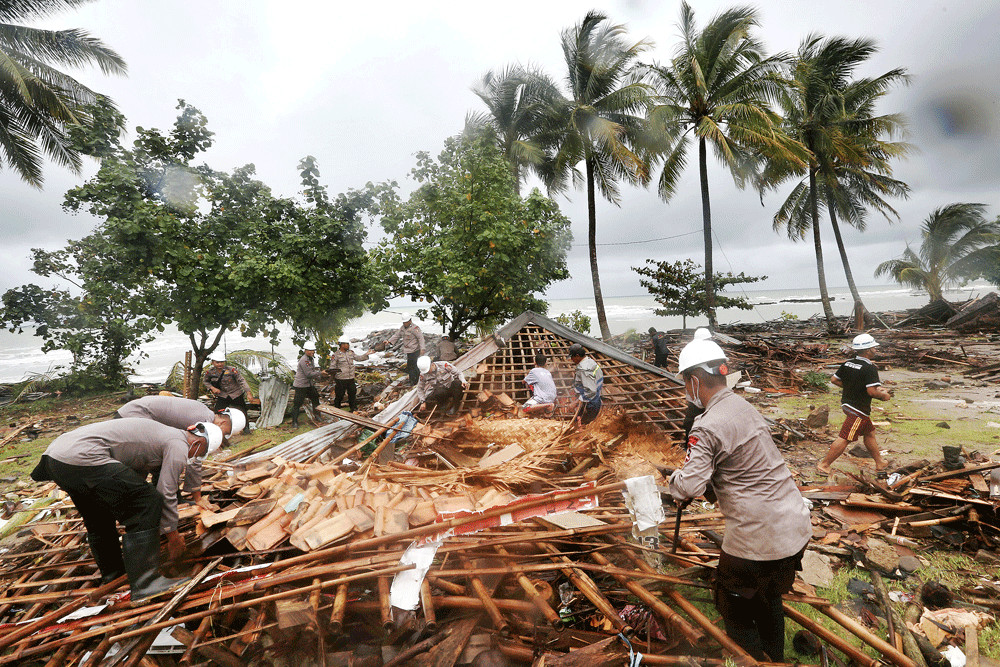Popular Reads
Top Results
Can't find what you're looking for?
View all search resultsPopular Reads
Top Results
Can't find what you're looking for?
View all search resultsNew BNPB head wants TNI to guard disaster warning devices
The new National Disaster Mitigation Agency (BNPB) head Lt. Gen. Doni Monardo went as far as to ask Jokowi to order military personnel to guard new disaster early detection devices that will be procured by BNPB soon in tsunami-prone areas and regions with active fault lines.
Change text size
Gift Premium Articles
to Anyone
 Police personnel help residents collect pieces of a collapsed house at Carita Beach in Pandeglang, Banten, on Dec. 26, 2018. The National Disaster Mitigation Agency (BNPB) reported that the tsunami, which was triggered by eruptions from Anak Krakatau, left 430 people dead, 1,495 injured, 159 missing and 21,991 displaced. (The Jakarta Post/Dhoni Setiawan )
Police personnel help residents collect pieces of a collapsed house at Carita Beach in Pandeglang, Banten, on Dec. 26, 2018. The National Disaster Mitigation Agency (BNPB) reported that the tsunami, which was triggered by eruptions from Anak Krakatau, left 430 people dead, 1,495 injured, 159 missing and 21,991 displaced. (The Jakarta Post/Dhoni Setiawan )
A
string of deadly tsunamis and earthquakes that devastated Indonesia last year has served as a wake-up call for the government to go the extra mile in improving risk management and early warning systems in the disaster-prone country.
President Joko "Jokowi" Widodo gathered his Cabinet members and heads of relevant agencies in a meeting on Monday, during which he called for his administration, particularly the National Disaster Mitigation Agency (BNPB), to improve the nation's disaster-mitigation measures, ranging from better early detection systems to disaster education at schools.
"We must ensure that early warning systems are well-organized so that the public will know [what to do when disaster strikes] and we can minimize the number of casualties," Jokowi said.
It was Jokowi's second instruction this year after he opened the first Cabinet meeting of 2019 last Monday -- during which he also revealed he had allocated more funds for mitigation and disaster education -- and the first after he swore in the new BNPB head Lt. Gen. Doni Monardo last Wednesday.
In the meeting on Monday, Doni went as far as to ask to Jokowi to order military personnel to guard new disaster early detection devices in tsunami-prone areas and regions with active fault lines -- which would be procured by BNPB soon.
"I have proposed to the President that the detection systems must be treated similar to those of vital national facilities and must be guarded by the members of the Indonesian Military [TNI]," Doni told the media after the Cabinet meeting on Monday.
"If the detection systems do not function properly, people living in coastal areas won't be able to get information and when a tsunami occurs, the casualties might be higher.”
Doni said that many existing detection systems installed in several areas across the country no longer functioned properly because they had either been damaged by irresponsible people or had deteriorated as a result of the weather.
The BNPB is currently consulting a number of experts, who are assisting the government in conducting assessments to determine the ideal locations for installing the new early warning devices.
In December, a tsunami triggered by a flank collapse on Mount Anak Krakatau hit coastal towns in Banten and Lampung along the Sunda Strait, killing over 400 people without warning. The Meteorology, Climatology and Geophysics Agency (BMKG) later revealed that tsunami-detection buoys around the area had been missing since 2007.
The BNPB subsequently revealed that at least 22 tsunami-detection buoys installed in waters across the country no longer operated because, among other reasons, their sensors had been stolen or because of a lack of maintenance caused by insufficient funding.
BMKG head Dwikorita Karnawati said that her office and the Agency for the Assessment and Application of Technology (BPPT) was planning to install underwater sensors that could detect hydrostatic pressures triggered by tsunamis. The sensors would send the signals to tsunami-detection buoys so that they could issue tsunami warnings immediately.
She declined to reveal the details of the procurement, but said the installations would take place in tsunami-prone areas.
"For instance, in a number of zones near Sumatra as well as zones that are determined to be vulnerable to tsunamis," Dwikorita said.
The government is determined to complete the procurement and installation process in the next three months and the President has agreed to assign TNI commander Marshal Hadi Tjahjanto to issue an order that the detection systems be guarded by military personnel, according to Doni. (ipa)









